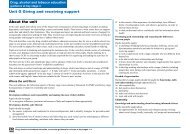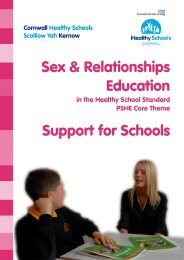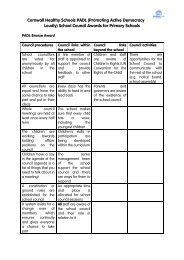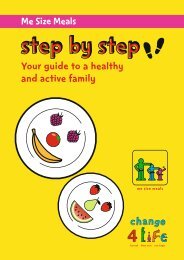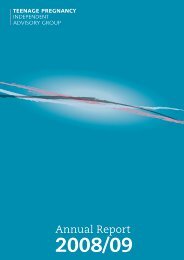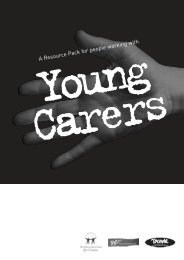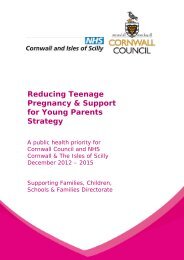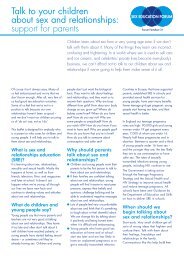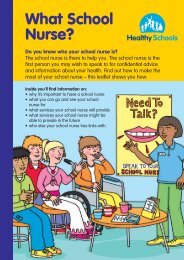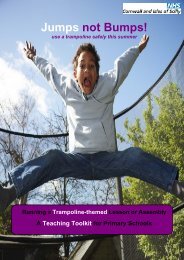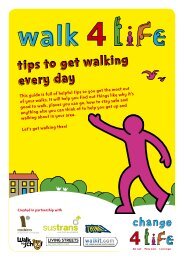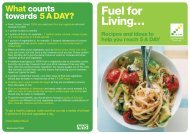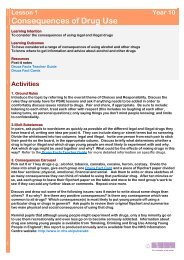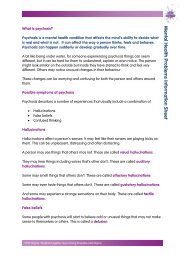Treloweth Primary School, Cornwall - Cornwall Healthy Schools
Treloweth Primary School, Cornwall - Cornwall Healthy Schools
Treloweth Primary School, Cornwall - Cornwall Healthy Schools
Create successful ePaper yourself
Turn your PDF publications into a flip-book with our unique Google optimized e-Paper software.
White-out only logo<br />
<strong>School</strong> Example:<br />
<strong>Treloweth</strong> <strong>Primary</strong> <strong>School</strong>, <strong>Cornwall</strong><br />
Focus: <strong>Healthy</strong> weight<br />
<strong>School</strong> context<br />
Our primary school is located in a poor area of<br />
<strong>Cornwall</strong>, which is listed amongst the top 15 percent<br />
of the most socially deprived areas nationally.<br />
Based near to large housing estates, the school’s<br />
catchment area includes some communities which<br />
also suffer significant health inequalities.<br />
Health issues<br />
We identified healthy weight as an issue that<br />
needed to be addressed amongst children and<br />
young people within our school setting – an issue<br />
that also impacts the wider <strong>Cornwall</strong> region.<br />
Teachers from all 14 classes identified a total of 22<br />
children and young people aged between 7 and<br />
11 in the school whose learning and development,<br />
they felt, was being adversely affected by negative<br />
concerns around weight or self esteem. Our goal<br />
was to work directly with this group to educate and<br />
raise their awareness around healthy eating and to<br />
promote exercise activities that would improve their<br />
self confidence.<br />
Partnerships & activities<br />
One of our most important partnerships was with<br />
parents. Whilst we wanted to work closely with this<br />
identified group of children, we did not want to<br />
single them out and stigmatise their involvement<br />
and therefore contacted all parents and carers and<br />
asked them for their ideas on how we could best<br />
address the issue. As a result, they suggested the<br />
‘Looking after Me’ club and 22 children we’d already<br />
identified, took part.<br />
Through ‘Looking after Me’, we established a<br />
timetable, outside class hours, that would support<br />
them to make the right decisions around healthy<br />
eating and exercising. One session, for example,<br />
involved an exercise programme where a pedometer<br />
was used to measure progress. Another time,<br />
the group looked at healthy cooking and another<br />
initiative worked with club members to promote<br />
self esteem and confidence.<br />
We worked with a number of external partners<br />
including nutritionists from the <strong>Primary</strong> Care<br />
Trust (PCT) to involve children with assessing the<br />
nutritional value of their lunch boxes and they<br />
participated in ‘taster sessions’ which encouraged<br />
them to try new, healthy food options.<br />
We also drew heavily on local leisure services.<br />
For example, some lessons saw children and young<br />
people move from the school grounds to a local<br />
leisure centre where they used the trampoline or<br />
swimming pool. Another initiative saw the group<br />
go for a meal at a farm /restaurant, where the club<br />
members selected their own healthy meal option<br />
and learnt about how their food was produced. For<br />
most, the day out was a reward as many had never<br />
been out for a meal before.<br />
Measuring success<br />
When addressing a sensitive issue such as healthy<br />
weight and emotional well-being, measuring<br />
success can be challenging as it’s not possible<br />
to weigh participants and record weight changes.<br />
1
We therefore relied on feedback from parents<br />
and participants to act as early success indicators.<br />
Their comments showed us that we were on the<br />
right path to making a positive change with one<br />
parent commenting that: “Since the club started my<br />
daughter is more positive about herself, she seems<br />
happier and more motivated and has learnt how<br />
different foods and exercise can keep her healthy.<br />
The best thing is she feels part of a team and is<br />
supported by her friends and teachers.”<br />
Contact<br />
For more information, please contact<br />
Annie Walpole, <strong>Healthy</strong> <strong>School</strong>s Co-ordinator,<br />
<strong>Treloweth</strong> <strong>Primary</strong> <strong>School</strong>.<br />
Email: awalpole@treloweth.cornwall.sch.uk<br />
Phone: 01209 216192<br />
<strong>School</strong> staff also noticed that the children were<br />
more confident and motivated in the classroom<br />
as well. During the six month initiative, the children<br />
also kept a diary and we noticed a change in their<br />
entries during the intervention which indicated they<br />
were taking greater pride in their work and feeling<br />
more confident.<br />
Lessons learned<br />
My advice to any school that addresses healthy<br />
eating and emotional well-being would be<br />
around managing resources. Whilst school<br />
staff were enthusiastic about tackling the issue,<br />
it impacted on their schedule. But if managed<br />
correctly, a targeted intervention programme<br />
can really make a difference, in and outside<br />
the classroom.<br />
Getting support from parents is also key to success.<br />
Parents need to be informed from the beginning by<br />
being invited to contribute ideas. By taking a whole<br />
school approach, we were able to get positive<br />
support from parents and also remove any possible<br />
stigma that could be attached with the club.<br />
2



